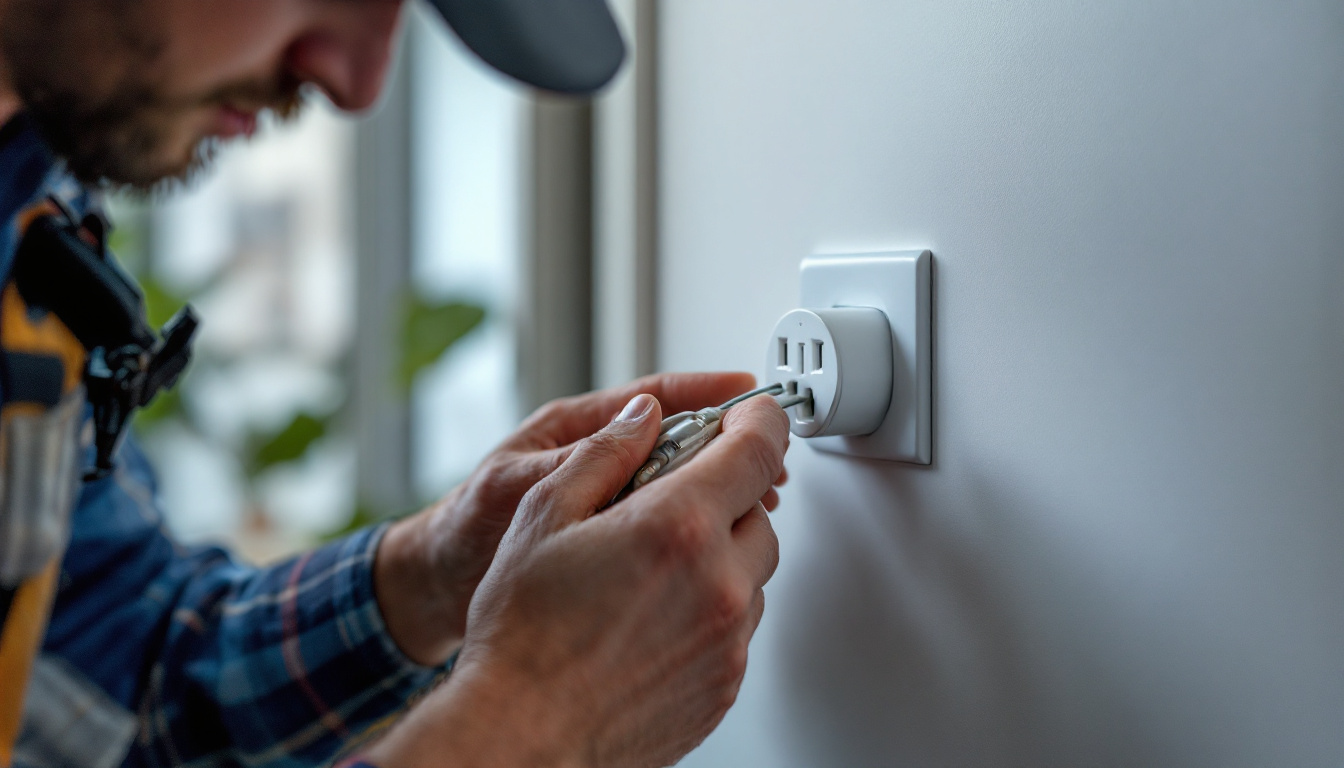
In the world of electrical installations, the demand for 4 plug electrical outlets has surged, particularly in residential and commercial spaces. Clients are increasingly looking for solutions that offer convenience, efficiency, and safety. As a lighting contractor, understanding the nuances of these outlets is essential to meet client expectations effectively. This article delves into what clients expect from lighting contractors regarding 4 plug electrical outlets, covering installation, safety standards, and energy efficiency.
Before diving into client expectations, it is crucial to grasp what a 4 plug electrical outlet entails. Typically designed to accommodate multiple devices, these outlets provide four sockets instead of the standard two. This design is particularly beneficial in environments where power needs are high, such as kitchens, offices, and entertainment areas. The increased number of sockets can significantly reduce the clutter of power strips and extension cords, creating a cleaner and safer environment.
There are several types of 4 plug outlets available on the market, each catering to different needs and preferences. Some are designed for standard household use, while others may include USB ports for charging mobile devices. Understanding these variations allows contractors to recommend the most suitable options to their clients. For instance, outlets with built-in USB ports eliminate the need for bulky adapters, making them a popular choice for modern homes where smartphones and tablets are ubiquitous.
Additionally, some 4 plug outlets come with surge protection features, which can safeguard sensitive electronics from voltage spikes. Clients often appreciate the added layer of security, making it a selling point for contractors. Moreover, certain models may offer smart technology integration, allowing users to control their outlets remotely via smartphone apps, enhancing convenience and energy efficiency. This feature is particularly appealing to tech-savvy clients who prioritize smart home solutions.
4 plug electrical outlets are versatile and can be used in numerous settings. In residential spaces, they are often installed in living rooms, bedrooms, and home offices to accommodate multiple devices such as lamps, computers, and chargers. In commercial settings, these outlets can be found in conference rooms and workstations where multiple devices need to be powered simultaneously. The flexibility of these outlets makes them ideal for dynamic environments that require frequent rearrangement of electronic equipment.
Understanding the specific applications can help contractors tailor their services to meet client needs, ensuring that the right type of outlet is installed in the right location. For example, in a kitchen, a 4 plug outlet may be strategically placed near countertops to facilitate the use of small appliances like blenders and toasters. In contrast, in a home office, it might be positioned to support a computer, printer, and charging stations for various devices. This thoughtful placement not only enhances functionality but also contributes to a more organized and efficient workspace, ultimately improving the user experience.
When it comes to the installation of 4 plug electrical outlets, clients have specific expectations that lighting contractors must be aware of. These expectations revolve around professionalism, efficiency, and adherence to local codes and regulations.
Clients expect lighting contractors to possess a high level of expertise when installing 4 plug outlets. This includes knowledge of electrical codes, safety standards, and best practices. Contractors should be able to explain the installation process clearly and answer any questions the client may have.
Moreover, professionalism extends beyond technical knowledge. Clients appreciate punctuality, cleanliness, and respect for their property. Ensuring a tidy work area and minimizing disruption during installation can significantly enhance client satisfaction.
In addition, clients often look for contractors who can provide insights into the latest technologies and trends in electrical installations. This might include discussing energy-efficient solutions or smart outlet options that can enhance the functionality of their space. By demonstrating a commitment to ongoing education and awareness of industry advancements, contractors can further instill confidence in their clients.
Time is often of the essence for clients, especially in commercial settings where downtime can lead to lost revenue. Therefore, contractors are expected to complete installations efficiently without compromising quality. Providing a timeline for the project and sticking to it can help build trust with clients.
Furthermore, being prepared with the necessary tools and materials can streamline the installation process, making it more efficient. Clients appreciate contractors who can complete the job promptly while maintaining high standards.
Additionally, effective communication throughout the installation process is crucial. Clients expect regular updates on progress and any potential issues that may arise. This transparency not only keeps clients informed but also allows for quick adjustments to be made if needed, ensuring that the project remains on track. A proactive approach in addressing any unforeseen challenges can greatly enhance the overall client experience and satisfaction with the service provided.
Safety is a paramount concern when it comes to electrical installations. Clients expect lighting contractors to adhere strictly to safety standards and local codes. This not only protects the client but also ensures the longevity and reliability of the electrical system.
Every region has specific electrical codes that must be followed during installations. Clients expect contractors to be well-versed in these regulations to avoid potential legal issues. This includes knowledge of load capacities, wiring methods, and grounding requirements.
Being able to demonstrate compliance with local codes can reassure clients that the installation is safe and reliable. Contractors should also be prepared to provide documentation or certifications if requested. Furthermore, staying updated on changes to these codes is essential, as they can evolve based on new technologies and safety research. Regular training and workshops can help contractors remain informed, ensuring that they can provide the best service while minimizing risks associated with outdated practices.
In addition to adhering to codes, contractors should implement safety measures during the installation process. This includes using appropriate personal protective equipment (PPE) and ensuring that the power supply is turned off before beginning work. Clients expect contractors to take all necessary precautions to prevent accidents and injuries.
Moreover, educating clients about the safety features of the installed outlets, such as surge protection and circuit breakers, can further enhance their confidence in the installation. It’s also beneficial for contractors to explain the importance of regular maintenance checks and inspections, which can help identify potential hazards before they become serious issues. By fostering an understanding of ongoing safety practices, contractors not only empower their clients but also promote a culture of safety that extends beyond the initial installation.
Additionally, implementing a robust safety protocol that includes clear communication about the steps being taken during the installation can further instill trust. For instance, explaining the rationale behind certain safety measures, such as the use of GFCI outlets in wet areas, can help clients appreciate the complexities of electrical work. This transparency not only enhances client satisfaction but also reinforces the contractor’s commitment to safety and professionalism throughout the project.
With growing awareness of environmental issues, clients are increasingly concerned about energy efficiency. As a lighting contractor, understanding how 4 plug electrical outlets can contribute to energy savings is essential.
Clients often seek outlets that are designed with energy efficiency in mind. This includes options that feature smart technology, allowing users to monitor and control energy consumption remotely. Educating clients about these options can position contractors as knowledgeable and forward-thinking.
Additionally, recommending energy-efficient devices to plug into these outlets can further enhance energy savings. Clients appreciate contractors who take a holistic approach to energy efficiency, considering both the outlets and the devices that will be used.
Contractors can also promote sustainable practices by encouraging clients to recycle old outlets and devices. Providing information on how to dispose of electronic waste responsibly can resonate well with environmentally conscious clients.
By demonstrating a commitment to sustainability, contractors can differentiate themselves in a competitive market and build lasting relationships with clients who share similar values.
Effective communication is vital in ensuring that clients feel informed and confident in their decisions regarding 4 plug electrical outlets. Lighting contractors should prioritize client education throughout the process.
Clients may not always be aware of the various options available for 4 plug outlets. Taking the time to explain the differences between standard and smart outlets, as well as the benefits of surge protection, can empower clients to make informed choices.
Moreover, discussing the installation process and what to expect can alleviate any concerns clients may have. Transparency fosters trust and can lead to positive referrals and repeat business.
After the installation is complete, clients appreciate follow-up communication to ensure they are satisfied with the work. This can include checking in to see if they have any questions or concerns about the new outlets.
Providing ongoing support and being available for future questions or issues can solidify a contractor’s reputation as a reliable and customer-focused professional. This level of service can lead to long-term relationships and increased client loyalty.
In conclusion, understanding what clients expect regarding 4 plug electrical outlets is crucial for lighting contractors aiming to excel in their field. By focusing on professionalism, safety, energy efficiency, and effective communication, contractors can not only meet but exceed client expectations.
As the demand for versatile and efficient electrical solutions continues to grow, staying informed about the latest trends and technologies will position contractors as leaders in the industry. Ultimately, the goal is to provide clients with safe, reliable, and efficient electrical installations that enhance their spaces and meet their needs.
Ready to exceed your clients’ expectations with the highest quality 4 plug electrical outlets? Look no further than LumenWholesale, where we provide contractors with spec-grade lighting products at unbeatable wholesale prices. Our selection is designed to meet the highest industry standards, ensuring you deliver safe, reliable, and efficient electrical installations every time. With LumenWholesale, you can enjoy the convenience of bulk buying with free shipping, getting premium lighting at the best value — without hidden fees or compromises. Elevate your lighting projects by choosing Wholesale Lighting at the Best Value today.

Discover how LED solar lights can transform outdoor spaces while boosting profitability in lighting installations.

Discover how choosing the right lights can illuminate homes while cutting costs for lighting contractors.

Discover the essential insights lighting contractors need to know about vanity lights.

Discover how bollards with solar lights are revolutionizing the lighting industry by offering sustainable, efficient, and cost-effective solutions.